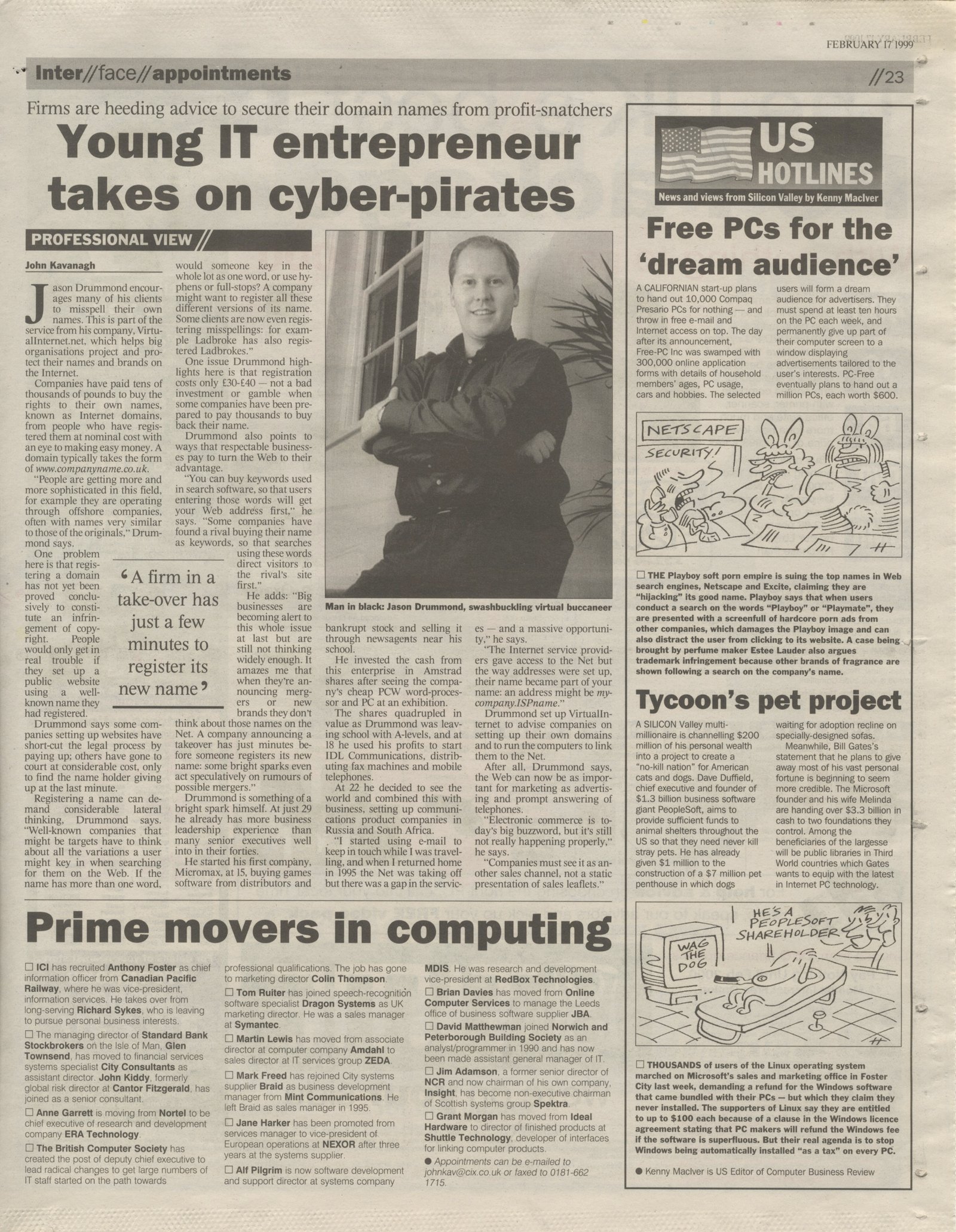Firms are heeding advice to secure their domain names from profit-snatchers
Young IT entrepreneur takes on cyber-pirates
Man in black : Jason Drummond, swashbuckling virtual buccaneer
John Kavanagh
Jason Drummond encourages many of his clients to misspell their own names. This is part of the service from his company, Virtuallnternet.net, which helps big organisations project and protect their names and brands on the Internet. Companies have paid tens of thousands of pounds to buy the rights to their own names, known as Internet domains, from people who have registered them at nominal cost with an eye to making easy money. A domain typically takes the form of www.companyname.co.uk. “People are getting more and more sophisticated in this field, for example they are operating through offshore companies, often with names very similar to those of the originals,” Drummond says.
One problem here is that registering a domain has not yet been proved conclusively to constitute an infringement of copyright. People would only get in real trouble if they set up a public website using a well- known name they had registered.
Drummond says some companies setting up websites have short-cut the legal process by paying up; others have gone to court at considerable cost, only to find the name holder giving up at the last minute. Registering a name can demand considerable lateral thinking, Drummond says. “Well-known companies that might be targets have to think about all the variations a user might key in when searching for them on the Web. If the name has more than one word would someone key in the whole lot as one word, or use hyphens or full-stops? A company might want to register all these different versions of its name. Some clients are now even registering misspellings: for example Ladbroke has also registered Ladbrokes.” One issue Drummond high-lights here is that registration costs only £30-£40 – not a bad investment or gamble when some companies have been prepared to pay thousands to buy back their name. Drummond also points to ways that respectable businesses pay to turn the Web to their advantage. “You can buy keywords used in search software, so that users entering those words will get your Web address first,” he says. “Some companies have found a rival buying their name as keywords, so that searches using these words direct visitors to the rival’s site first.” He adds : “Big businesses are becoming alert to this whole issue at last but are still not thinking widely enough. It amazes me that when they’re announcing mergers or new brands they don’t think about those names on the Net. A company announcing a takeover has just minutes be- fore someone registers its new name: some bright sparks even act speculatively on rumours of possible mergers.” Drummond is something of a bright spark himself. At just 29 he already has more business leadership experience than many senior executives well into in their forties. He started his first company, Micromax, at 15, buying games software from distributors and bankrupt stock and selling it through newsagents near his school. He invested the cash from this enterprise in Amstrad shares after seeing the company’s cheap PCW word-processor and PC at an exhibition. The shares quadrupled in value as Drummond was leaving school with A-levels, and at 18 he used his profits to start IDL Communications, distributing fax machines and mobile telephones. At 22 he decided to see the world and combined this with business, setting up communications product companies in Russia and South Africa. “I started using e-mail to keep in touch while I was travel- ling, and when I returned home in 1995 the Net was taking off but there was a gap in the services – and a massive opportunity,” he says. “The Internet service providers gave access to the Net but the way addresses were set up, their name became part of your name : an address might be my- company. ISP name.” Drummond set up VirtualInternet to advise companies on setting up their own domains and to run the computers to link them to the Net. After all, Drummond says, the Web can now be as important for marketing as advertising and prompt answering of telephones. “Electronic commerce is to- day’s big buzzword, but it’s still not really happening properly,” he says. “Companies must see it as an- other sales channel, not a static presentation of sales leaflets.”

Leave a Reply
You must be logged in to post a comment.